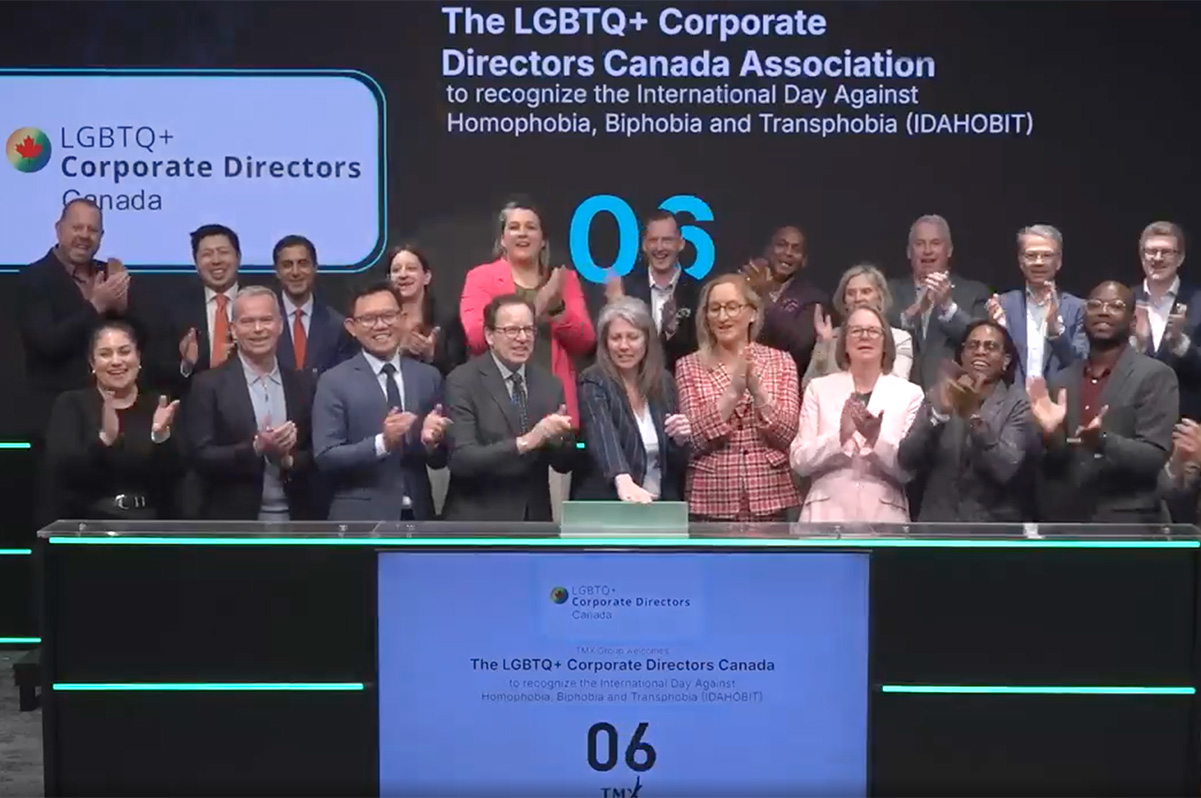News
Meet the new LGBTQ liaison for the Democratic National Committee
Sam Alleman joins DNC after work in abortion rights movement

The new LGBTQ liaison for the Democratic National Committee comes from a background not in LGBTQ advocacy, but in the abortion rights movement, and sees the two as working “hand in hand” for a common cause.
Sam Alleman, who started Monday as LGBTQ coalitions director for the DNC, said in an interview with the Washington Blade that his previous job as political outreach manager for five years at the Planned Parenthood Action Fund will inform his LGBTQ work going forward.
“The reproductive rights movement goes hand in hand with what we’ve been fighting for in the LGBTQ equality and equity movement as well,” Alleman said. “There is no being LGBTQ without your ability to have bodily autonomy and to make those same choices.”
The relationship between the LGBTQ movement and abortion rights may be more pronounced in the coming months: A national battle is taking place over a Texas law banning abortion in the state for any woman pregnant for more than six weeks as the U.S. Supreme Court will consider litigation with the potential to overturn Roe v. Wade. LGBTQ legal advocates, faced with a term at the Supreme Court with no major cases specific to LGBTQ rights, are already turning their focus to the abortion cases.
“I think that the gender equity lens here, as we move toward building out that permanent infrastructure that really brings all of those things together through more of a social justice lens, will be absolutely critical to being successful, particularly speaking to our younger demographics, to making sure trans and queer people feel included in a way that’s actually equitable and just,” Alleman said.
Alleman identified two key priorities for him in his new role at the DNC — turning out LGBTQ voters for Democratic candidates and building an internal infrastructure for the LGBTQ community — and said his previous work at Planned Parenthood Action Fund working with candidates and coalition groups will help him reach that goal.
“I really plan to use a lot of the lessons that I learned there in building out to making an inclusive campaign, both in programs and in voter contact infrastructure, within the party itself as well,” Alleman said.
Alleman, reiterating he was still in the first days of his job, said the process for building out the LGBTQ community infrastructure at the DNC is still in its initial phases. Alleman said his vision would be not only turning out LGBTQ voters, but finding a way that “allows them to plug in as volunteers and leaders within the party to do the voter contact to hold the events on the ground, to work with our state party partners, and making sure that their voices are represented.”
Key to building out that infrastructure, Alleman said, would be making sure all voices within the LGBTQ community are heard. Alleman made a special point to say queer and transgender people “who have been our partners for so long and deserve a seat at the table” will be an essential part of the infrastructure.
The voice of LGBTQ people, Alleman said, will be increasingly important in elections as the numbers of voters who identify as LGBTQ increase. Pointing to 2020 exit polls showing 7 percent of the electorate identified as LGBTQ, Alleman said more LGBTQ people than ever turned out in the presidential election and overwhelmingly backed Biden by 61 percent. (Republicans were also able to claim a small victory, having doubled their share of LGBTQ voters from 14 percent to 28 percent who voted for Donald Trump after the previous election.)
“We know that that demographic is only growing,” Alleman said. “Within under 18 year olds, approximately 16 percent of folks identify as LGBTQ in this country. So really my priorities are building out an infrastructure here at the DNC, that will turn out LGBTQ voters for Democratic candidates as they become a larger and larger subsection of our voting population.”
Alleman joins the Democratic National Committee days before a Virginia gubernatorial election observers see as a national bellwether for upcoming congressional midterm elections. Terry McAuliffe, a Democratic former governor who said in a interview with the Blade his opponent is the “most homophobic, anti-choice” candidate in Virginia history, is running against Glenn Youngkin, who said recently he continues to oppose same-sex marriage but “will support” the law.
Polls show an exceedingly close race in a state President Biden won handily in the presidential election. An Emerson College/Nexstar Media poll found the race is a dead heat and McAuliffe and Youngkin are tied with 48-48 percent each. The election is Tuesday.
Asked what he sees as his role in the closing days of the Virginia election, Alleman reiterated he was still on Day One of his role at the DNC, but believes Democrats are “doing everything possible to turn out different constituency groups for Terry McAuliffe and Democrats, up and down the ballot in Virginia.”
“My role as I start to step in here is really working to make sure that our national partner organizations are doing everything possible to turn out that book as we head into GOTV, and be a partner to them as they drive their supporters out to make sure that we’re not leaving anything on the table come next Tuesday when we elect Terry McAuliffe governor of Virginia again,” Alleman said.
Lucas Acosta, a spokesperson for the DNC who joined in on the interview with Alleman, said the DNC is working with groups such as the Human Rights Campaign (his former employer) to highlight the records of both Virginia candidates.
“I think what happened last week — Youngkin’s comments on same-sex marriage — are concerning,” Acosta said. “That’s definitely something that we are going to continue to highlight in the closing days of the campaign. That obviously is just a further example why Youngkin is not the moderate he purports to be, but rather a Trump acolyte, who is going to turn back time on rights for a litany of Virginians, including LGBTQ folks.”
Democrats have enjoyed an advantage as a result of the sea change in support in favor of LGBTQ rights. But things may be beginning to shift as LGBTQ issues change and move away from same-sex marriage to other battlegrounds, such as transgender people participating in school sports consistent with their gender identity.
Washington Post columnist James Hohmann reported this week on new data from the National Republican Senatorial Committee finding gender and race issues play out in favor of Republicans among suburban voters, if they’re on terms like critical race theory or concepts like “genderism.” According to the data, 65 percent said “allowing biological males to compete against women in high school and college sports is hugely unfair and will erase many of the gains women have made in athletics over the last 50 years.”
Just this week, Texas Gov. Greg Abbott signed into law House Bill 25, which effectively bars transgender girls from participating in school sports consistent with their gender identity, making the Lone Star State the latest state to enact such a measure in defiance of federal laws against discrimination based on sex.
Alleman, asked whether the DNC would change the way it approaches these issues, said he wasn’t aware of the data and questioned whether the conclusion of the data “really makes much sense.”
“I think we’ll at least continue to push forward the message of what we’ve done as Democrats which is fight for these individuals to be treated just the same as everyone else,” Alleman said.
World Pride 2025
Tourists, locals express concerns about WorldPride security
Officials say no credible threats have been reported

With WorldPride upon us, Washington, D.C. is preparing to welcome an estimated 2 million people who will flock to the District to celebrate queer love, identity and resistance, with another 1 million regional LGBTQ community members expected to attend.
With so many people visiting from across the ocean (as well as across the Potomac) amid a less-than-supportive presidential administration, the issue of safety has become a major concern for those attending and hosting events.
Various social media platforms — including Instagram, X (formerly known as Twitter), and Reddit — have become spaces for residents and tourists alike to air their concerns about safety and security. Many have cited the Trump-Vance administration by name as the source of their fear.
“As much as I appreciate PRIDE — can’t help but think @realdonaldtrump is going to step in at the last minute and y’all are going to have to scramble for backup plans…” one person commented under a WorldPride Instagram post listing some of the events planned for Pride.
“Trump better leave this alone and let us do our thing,” said another user under the same post.
Beyond general unease, others pointed to concrete concerns, citing the Trump administration’s policies and past behavior as reasons for alarm. From detaining outspoken critics to restricting international travel, the fear of interference feels rooted in precedent.
“Just worrying a bit for anyone traveling to the USA right now, in particular if they are not a citizen,” another person commented on a Capital Pride Instagram post. “Especially if they have stuff on their phone etc. that shows that they’re not 100% in love with Trump’s policies. Don’t get me wrong, it’s more important than ever to protest and celebrate in D.C. for the right to be different. Just wondering how we can make it as safe as possible??”
“So the reality of the situation is that 1) the threat profile has increased 2) federal and local resources dedicated to security have massively shrunk 3) the federal government is overtly hostile to the protection of queer people,” said user Xcelsiorhs on Reddit. “There are compelling reasons not to host WorldPride in a country which is unconcerned with gay rights. The security nexus is just one complication and trans/queer immigration concerns are also towards the top of the list.”
“I am extremely worried about the security of the event. I really hope outside security is brought in to make it safe,” said another Reddit user. “Especially the festival and parade that are open to anyone.”
Last week Capital Pride, the local organization in charge of Washington’s Pride celebrations, hosted a webinar dedicated to community fears regarding health and safety. More than 150 people attended the virtual event to hear what the organization’s leaders had to say.
Organizers say they are prepared to address any challenges that arise.
“Tens of thousands of hours have been dedicated to this event,” said Sadhand Miraminy, the director of operations for Capital Pride and host of the safety webinar, ensuring safety is a top priority of the event organizers. “You all are in good hands.”
“It does take a city,” said Linda Lindamood, the director for health and safety for WorldPride, who highlighted various changes from Pride events in years past. “This is the city where people come to have their voices heard… We have worked diligently to address those ‘what ifs…’”
“There is a backup plan for everything,” Miraminy said, following participant questions about some of those “what ifs.”
Trevor Knight, the partner engagement program manager for D.C. Homeland Security, assured attendees that, so far, nothing indicates the event is a target.
“We do not have any credible threats to WorldPride,” Knight said, but he did note changes in some Pride protocols in the nation’s capital.
One of the biggest changes will be an established perimeter around the street festival on Pennsylvania Avenue. This year, it will be entirely fenced in with only nine entrance points — all of which will have metal detectors, bag checks, and nearby law enforcement.
Some social media users criticized the move, citing the history of Pride as justification. Others, like Reddit user ATLinDC, welcomed the change if it means a safer celebration.
“People uncomfortable with law enforcement having a visible presence in and around bars need to get over it. Our spaces need protecting should something go wrong. We do not need another Pulse,” they commented. “I welcome daddy cops on every corner!”
Despite some fears, the general feeling after the meeting — and among some online — was that they felt listened to and saw the organizations doing everything in their power to keep LGBTQ people safe.
“I have confidence that local bar owners and organizers are going to put their best foot forward on security,” said Reddit user Xcelsiorhs. “And the reality of the situation is it will not be enough and the scale of the problem far exceeds their capacity to respond to it. And it is not plausible the resourcing gap will be bridged.”
“The Metropolitan Police Department (MPD) is working closely with our local, state, and federal partners as we prepare for WorldPride 2025. As with any other events in the District, it is our priority to ensure the safety and security of District residents and visitors. Further details about securing these events, road closures, and additional impacts will be released as we get closer to these events,” said Lee Lepe, public information officer for MPD.
“While there are no known threats to WorldPride 2025, we always encourage the public to remain vigilant. If you see something, say something. Please report threats and emergencies to 911. Keep your community safe by reporting suspicious activity by calling 202-727-9099, texting 50411, or visiting iwatchdc.org.”
D.C. police officials were noncommittal when asked if outside police forces from Virginia and Maryland would assist with security.
“I can confirm we are looking into that,” Tom Lynch, supervisory public affairs specialist for MPD, told the Blade in an email. “We will have more to share on this once it’s confirmed.”
Despite the concerns, Ryan Bos, executive director of Capital Pride, emphasized that those trying to keep LGBTQ people from celebrating Pride are the very reason the event must go on.
“We must remain visible,” said Bos. “We must continue to fight and show up.”
World
New stock exchange initiative promotes LGBTQ inclusion in private sector
‘Ringing the Bell for LGBTIQ+ Equality’ campaign kicked off in Toronto on Tuesday

More than a dozen stock exchanges around the world are participating in an initiative that seeks to promote LGBTQ inclusion in the private sector.
The first “Ringing the Bell for LGBTIQ+ Equality” ceremony took place on Tuesday at the Toronto Stock Exchange when members of the LGBTQ+ Corporate Directors Canada Association rang the closing bell.
(Video courtesy of the TMX Group)
Two “Ringing the Bell for LGBTIQ+ Equality” ceremonies took place on Wednesday at the London Stock Exchange and the Australia Stock Exchange. Similar events are scheduled to occur in Amsterdam, Brussels, Paris, Chicago, Mexico City, the Cambodian capital of Phnom Penh, the Namibian capital of Windhoek, and other cities throughout the month.
Koppa: The LGBTI+ Economic Power Lab and various U.N. agencies are behind the campaign that coincides with the International Day Against Homophobia, Biphobia and Transphobia.
IDAHOBiT commemorates the World Health Organization’s declassification of homosexuality as a mental disorder on May 17, 1990.
“This is more than just a symbolic gesture – it’s a global call to action to focus on LGBTIQ+ economic equality inclusion,” said Fabrice Houdart, co-founder of Koppa, in a press release that announced the “Ringing the Bell for LGBTIQ+ Equality” campaign. “Economic inclusion remains among the unfinished business of the LGBTIQ+ equality movement of the LGBTIQ+ equality movement around the world, including in the U.S. We are ringing the bell to remind the world: Our journey is far from over.”
“With an increasing number of governments trying to force businesses around the world to retreat on their support for basic equality, companies must step in and defend their right to do business as they see fit, including their support for equality for all,” he added.
District of Columbia
Rainbow History Project WorldPride exhibition to open May 18
‘Pickets, Protests and Parades’ to be on display at Freedom Plaza

D.C.’s Rainbow History Project is scheduled to open its WorldPride 2025 exhibition called “Pickets, Protests, and Parades: The History of Gay Pride in Washington” on Sunday, May 18, in Freedom Plaza.
Located on Pennsylvania Avenue, N.W. between 13th and 14th streets less than three blocks from the White House, the exhibition will be open to the public free of charge for 24 hours through July 6.
The exhibition “will chronicle the local LGBTQ+ Pride movement and how the pickets and protests of the 1960s led to the vibrant celebrations of the 2020s,” a statement released by Rainbow History Project says.
The statement notes that the exhibition’s displays will include photos and information about a 1965 protest in front of the White House by 10 gay men and lesbians carrying picket signs in what is believed to be one of the city’s and possibly the nation’s first public demonstrations in support of the then homosexual community.
“The exhibition disrupts the popularly held belief that the LGBTQ+ rights movement began with the Stonewall Riots in 1969 in New York,” the statement points out. It says the 1965 gay protest outside the White House, which took place four years before Stonewall, represents “the start of D.C.’s rich queer history.”
“Covering 1965 to the present, the exhibition explores the history of Pride in D.C. in 10 distinct thematic eras,” according to the statement. “Large hero images around the perimeter will draw people into the exhibit to explore a timeline wall with historic quotes from Pride’s organizers. Each of the 10 eras are detailed in thematic cubes rich with history and visuals.”
The statement says Rainbow History Project is seeking community members to serve as Exhibit Monitors to assist in operating the display in four shifts each day and night to be compensated from between $80 and $100 per shift depending on the time of the shift.
Information about applying to become an exhibit monitor can be accessed at Rainbow History’s website.
-

 Rehoboth Beach2 days ago
Rehoboth Beach2 days agoDel. Gov. Meyer to join Washington Blade party in Rehoboth on Friday
-

 Music & Concerts5 days ago
Music & Concerts5 days agoUnderdog glorious: a personal remembrance of Jill Sobule
-

 Real Estate4 days ago
Real Estate4 days agoImpact of federal gov’t RIF on D.C.’s rental market
-

 Opinions5 days ago
Opinions5 days agoMy chance encounter with a pope and why goodness still matters













